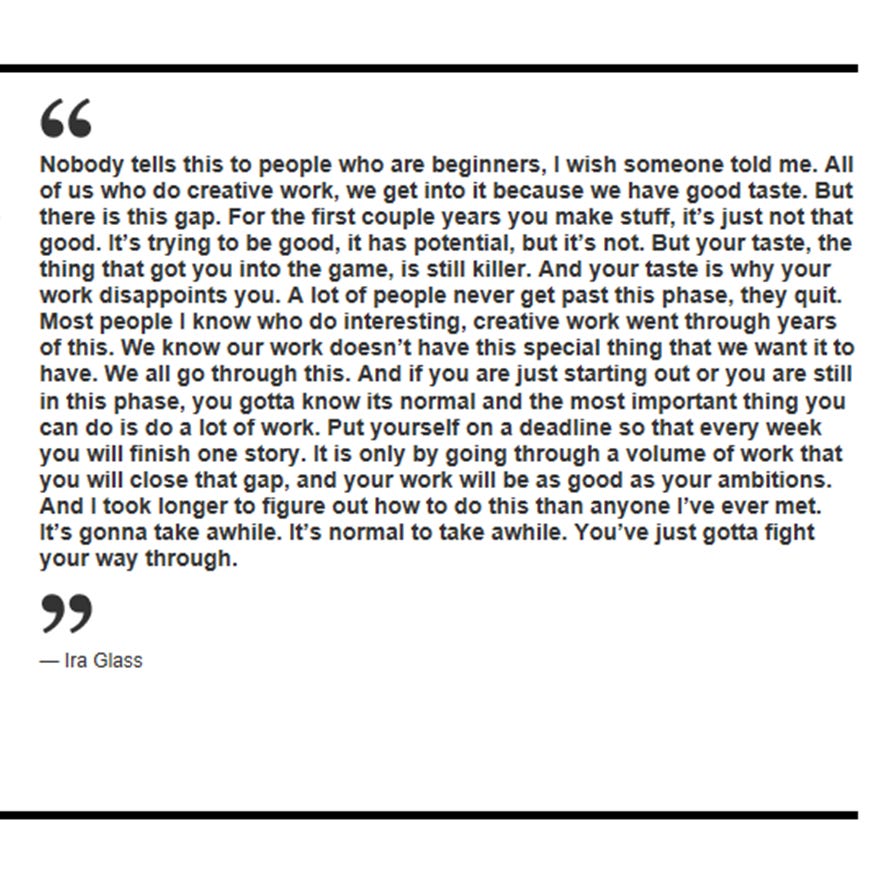
Hey everyone 👋. Greetings from Berlin!
Welcome to the 7 new people who signed up this week, which brings us to 208 subscribers. Here's the previous edition of the newsletter for those of you who missed it.
Thanks so much for being a subscriber. If you enjoy the newsletter, please forward it on. If you have 10 seconds to share a thought or an idea, please hit reply or comment below.
Line-up this week:
Quote of the week
The Berlin Marathon
Supportive conversations
Things you might like
1. Quote of the week
Slightly longer one this week.
Writer and media personality Ira Glass on how he struggled to create something that was worthy of his taste:
We all have to start somewhere. Eventually (hopefully), our work catches up with our ambitions. The key is to not quit along the way.
2. The Berlin Marathon
I'm taking part in my first marathon tomorrow!
While the nerves are high, I'm confident things will go well. It's been a hard three months of training, with 5-6 runs and 70-80 kilometers per week.
Here's a short write-up about the world's fastest 42.2km event:
The Berlin Marathon takes place in less than 24 hours.
Here's everything you need to know about the world's "fastest" marathon: pic.twitter.com/EVhoLFcHzQ— John Nicholas (@john__nic) September 24, 2022
Highlights:
There will be over 45,000 participants this year from 157 nations. 80 live bands will line the streets and up to 1 million supporters are expected to cheer on.
Due to the division of the city before the wall fell in 1989, marathon events were held in West Berlin. On 30 September 1990 athletes were able to run through the Brandenburg Gate for the 1st time. Since then the course has covered both halves of the unified city.
The course is marked with a set of triple blue lines that indicate the tangents on the course and mark the shortest possible route.
3. Supportive Conversations
In my essay last week (Become a Conversation Barista), I shared strategies to brew up better conversations by (i) finding shared interests, (ii) being present and (iii) opening up.
This week (call it serendipity), I was involved in two workshops with a very similar theme.
I. Supportive Conversations by Rik van den Berge
Rik van der Berge is an online writer and life coach based in the Netherlands. I had the privilege of co-hosting a workshop with him on supportive conversations and active listening last week.
Prompt: In a 1-on-1 conversation, let person A discuss a particular problem they are facing and person B is only allowed to reflect what A is saying back to them as a question. Switch roles after 5 minutes and repeat the same exercise.
The reflection exercise was powerful for two reasons:
The exercise strips us of the active problem solving tool. Humans are problem solvers. We naturally want to respond and give advice. The other person speaks and we are already thinking of our answer... Have you thought about this? Or have you read this? Or maybe you should speak to this person? This hijacks the conversation and steers it in a new direction. By reflecting, we actually listen and give the other person space to think out loud. It's not a failure if you don't have an answer.
Reflection helps you go one level deeper. A reflective sparring partner creates an environment for you to open up. The partner acts as a mirror. By hearing your answers come back as reflective, open-ended questions, you can peel back the layers and get to the core of the issue. You only know what you're thinking when you express it out loud (or write it out).
II. Facilitation Masterclass by Gwyn Wansbrough
The following night, the Write of Passage mentor team took part in a workshop hosted by virtual facilitation expert and experience designer Gwyn Wansbrough.
We performed active listening in breakout rooms using a similar prompt to the one above – reflect answers back as open-ended questions.
Here are my three favourite lessons I want to apply to my mentor sessions:
Be the guide on the side, not the sage on the stage. Give your students space to speak and participate instead of occupying the stage speaking about your own experiences.
Presence beats prep. Prioritize connection over content. Use fewer slides. Opt for gallery mode instead.
Lower the barriers. Find easy ways to get students to engage up front. The earlier they engage the more likely they are to stay engaged. State that you want full participation upfront.
4. Things you might like
📚 Book: The War of Art: Winning the Inner Creative Battle by Steven Pressfield. Thoroughly enjoying this short book packed with calls to action to overcome resistance and do the work we were put on earth for. “The most important thing about art is to work. Nothing else matters except sitting down every day and trying.” Ryan Holiday calls it the closest thing to a modern version of The Meditations by Marcus Aurelius. Bonus: Creators' Corner Reader Aaron Hartley suggested Pressfield's new book, Put Your Ass Where Your Heart Wants To Be.
🎙️ Podcast: The Tim Ferriss show with Roelof Botha. Roelof is a South African actuary turned Silicon Valley venture capitalist, most notably as partner at Sequoia Capital. Highlights from the conversation: Ulysses Pacts, Founder-Problem Fit (founders with a personal connection to the problem they're solving are often more successful), Pre-Mortems (what can go wrong), Pre-Parades (what can go right) and Crucible Moments (defining junctures in your career/business). Fun fact: Roelof attended the same high school I went to in Cape Town (Jan van Riebeeck).
Until next time. Have a great weekend and happy creating.
-- John
P.S. you can respond directly to this email or drop a comment below. I would love to hear from you.




